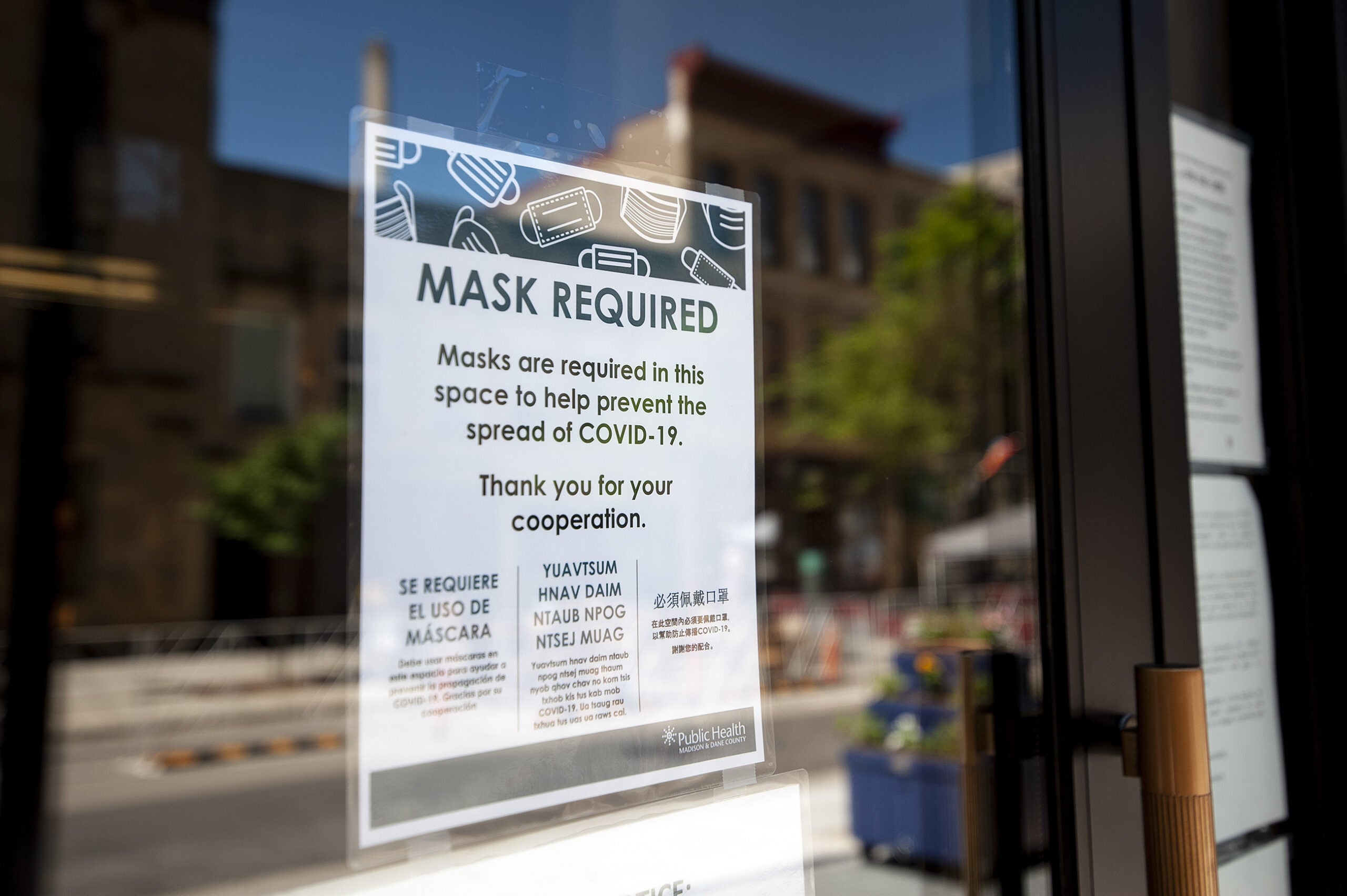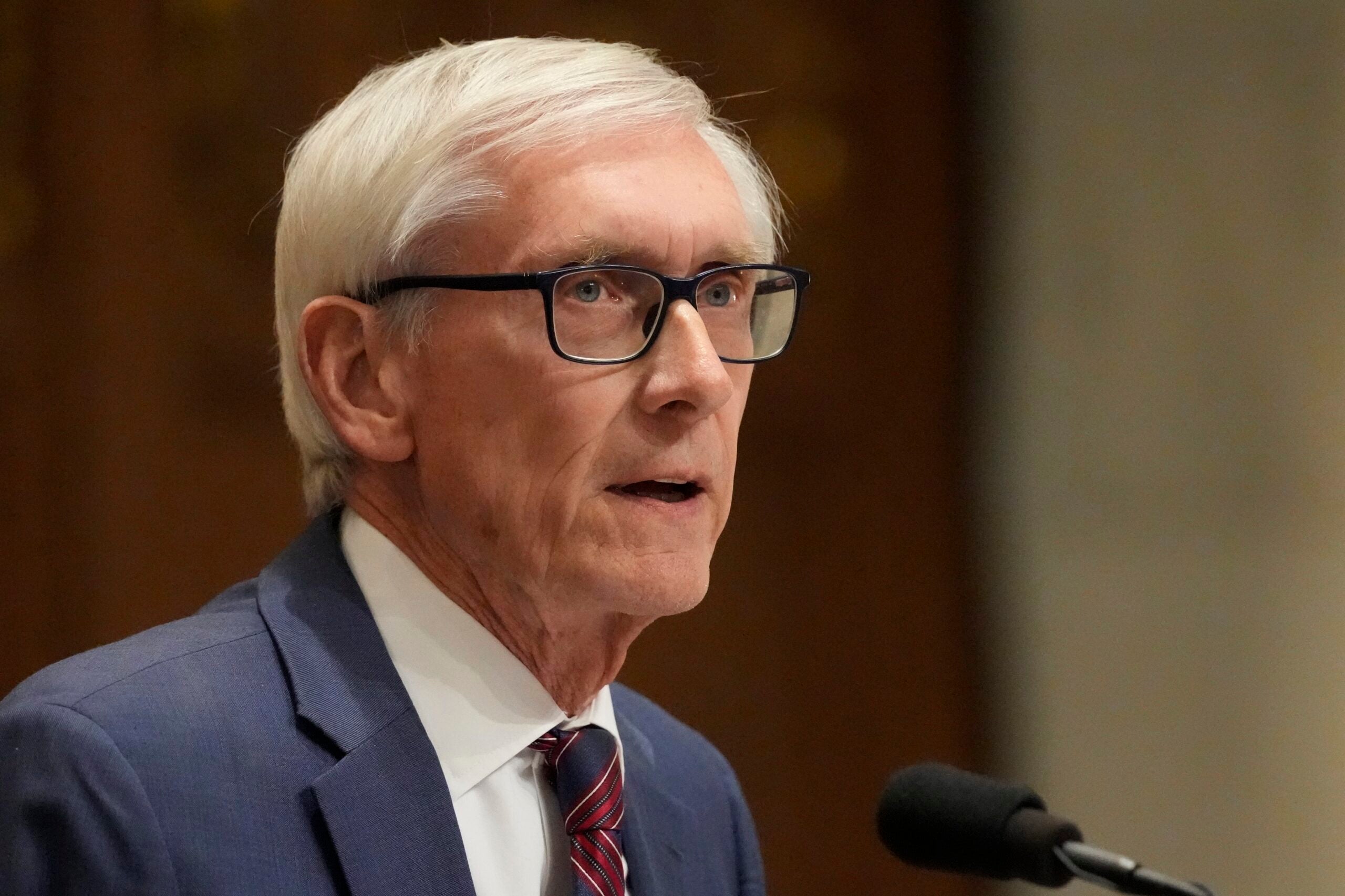Gov. Tony Evers issued a statewide mask mandate in Wisconsin on Thursday afternoon in an effort to slow the spread of the coronavirus, likely setting off a partisan battle about whether he has the legal authority to issue such an order.
The order will go into effect on Aug. 1 and is set to expire on Sept. 28. It will require people five-years-old and older to wear masks in indoor or “enclosed” public places when people who don’t live with them are present.
Those public places include indoor and outdoor bars and restaurants, stores, outdoor park structures and public transit. People who don’t follow the mandate could be fined up to $200.
News with a little more humanity
WPR’s “Wisconsin Today” newsletter keeps you connected to the state you love without feeling overwhelmed. No paywall. No agenda. No corporate filter.
Speaking on a call with reporters, Evers said a patchwork of local health orders, including some mask mandates, hasn’t been effective in limiting the spread of COVID-19 in Wisconsin.
“I know there have been those who have demanded a piecemeal, rather than a statewide, approach (to limiting the virus’ spread),” he said. “But we tried their way. Folks, it’s not working.”
Wisconsin has had several days with record-breaking numbers of new cases in the past two weeks.
The governor acknowledged some people don’t want to wear masks, but he urged them to do so.
“You may be frustrated about having to wear a mask, some people are frustrated about having to obey the speed limit, but they do that, too,” Evers said. “This is about life and death.”
Evers issued the order after weeks of speculation about whether he would take the step — and how long any such mandate would stand before being challenged in court.
A state Supreme Court decision on May 13 sharply limited the power of the governor’s administration to issue restrictions related to the COVID-19 pandemic. The governor’s individual executive powers are also in question, since he is now operating outside a 60-day window of power established in his March emergency declaration in response to the pandemic. Thursday’s mask mandate comes alongside a new emergency declaration, but there is some question about whether Evers has the power to issue two related emergency declarations.
The head of a conservative advocacy group that has brought a number of legal challenges against the governor has argued there’s no legal justification for Evers issuing a new emergency declaration.
“One cannot simply extend those emergency powers in series,” said Rick Esenberg, president and general counsel for the conservative Wisconsin Institute for Law and Liberty, in an interview with WPR earlier this month. “We can’t simply redeclare the emergency over and over again if it is essentially seen as part of the same problem.”
In a prepared statement Thursday, Esenberg said his group’s lawyers are “reviewing” the governor’s new action.
“Wearing a mask is courteous and smart,” Esenberg said. “But the presence of a pandemic does not negate the rule of law.”
A legal challenge to the emergency declaration and mask order would ultimately be decided by the state Supreme Court, which is about to undergo a shift in its partisan makeup. Liberal Justice-elect Jill Karofsky is set to take her seat on the court this Saturday, replacing conservative Justice Daniel Kelly. When Karofsky joins the court, its conservative majority narrows to 4-3.
Some speculate conservative Justice Brian Hagedorn, who sided with liberals in the court’s May decision on the Evers administration’s stay-at-home order, could provide a deciding vote to uphold the governor’s mask order.
However, Hagedorn’s opinion in May related to a technical element of the stay-at-home case, rather than constitutional arguments. A different approach in a mask case could realign him with his fellow conservative justices.
The mask order includes some exceptions.
People will not be required to wear a mask if they are participating in a number of activities, including eating, swimming or communicating with someone who is deaf or hard of hearing and communication “cannot be achieved through other means.” People with medical conditions, intellectual or developmental disabilities or other sensory sensitivities that prevent them from wearing a face covering are also exempt.
Facilities under the control of the state Legislature, like the state Capitol Building, and the state Supreme Court, are also exempt.
People are discouraged from using N95 masks to comply with the order, so those masks remain available for medical professionals in Wisconsin. Face coverings as defined in the order can include “bandana, a cloth face mask, a disposable or paper mask, a neck gaiter, or a religious face covering.” Plastic face shields do not qualify.
GOP Lawmakers Push Back On Order
While Democrats have urged Evers to issue a statewide mask order, Wisconsin Republicans have long been critical of statewide restrictions. The GOP lawmakers who control the state Legislature have spoken out against a mask mandate and argued restrictions related to coronavirus should be left to local governments.
Assembly Speaker Robin Vos, R-Rochester, reiterated that position on Thursday afternoon.
“Local governments have been responding appropriately and increasing precautionary methods as needed,” Vos said. “But Wisconsin shouldn’t have a one-size-fits-all mandate.”
Vos said he expected legal challenges to the mask order “from citizen groups.”
Republican Senate Majority Leader Scott Fitzgerald, R-Juneau, said “we don’t need statewide mandates telling us what to do.”
“Many people are wearing masks already,” he said. “Municipalities have been making the decisions themselves on what best fits their regions.”
Fitzgerald noted some local law enforcement may choose not to enforce the order.
“Certainly, the last thing our police need to be doing right now is serving as part of the mask patrol,” he said.
One of Fitzgerald’s colleagues, Sen. Steve Nass, R-Whitewater, called the governor’s new emergency declaration and mask order “illegal and uncessary.”
“Governor Evers’ actions today are nothing more than a political stunt to create a partisan fight with the Legislature,” Nass said. “This is not about improving public health.”
Nass urged GOP leaders to call the Legislature into a special session to override the governor’s emergency declaration. They could do so with majority votes in both chambers through a joint resolution, which would not require the governor’s signature to go into effect. Fitzgerald said he is gauging other Republican senators’ interest in reconvening.
On the Thursday call with reporters, Evers said that move would be risky and irresponsible.
“To come in and have the Republicans say we don’t believe in science, (that’s) pretty risky business — pretty risky political business and real risky health business,” the governor said.
The governor’s order puts Wisconsin in line with other Midwestern states. The Democratic governors of Illinois, Michigan and Minnesota have already issued mandates, as have the Republican governors of Indiana and Ohio.
Cases of COVID-19 continue to spread in Wisconsin. In new county-level data released Wednesday, the state reported 61 of its 72 counties now have high COVID-19 activity.
Wisconsin Public Radio, © Copyright 2025, Board of Regents of the University of Wisconsin System and Wisconsin Educational Communications Board.






